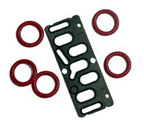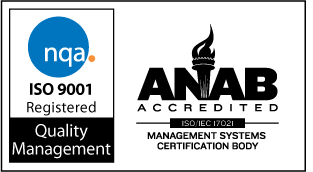
|
7108
S. Alton Way, Unit I |
(303) 758-2728
Home > Tips > High Temperature Seal
|
Tip: High Temperature SealIf a seal is held at a high temperature for a period of time, the elastomer will deteriorate to some extent. In particular, the compression set and volume will change. The hardness of the elastomer changes in two stages. At first, the seal will become softer. This can cause problems because the elastomer may flow through the clearance gap. Second, if the seal remains too hot, chemical changes will occur with the elastomer and the it will become harder. Choosing the right material for a high temperature seal is very important . FKM fluorocarbon seals resist hardening and embrittlement for more than 10,000 hours in air up to 204°C, and they withstand surges up to 315°C. Also, with the thermal capability of FKM fluorocarbon, some users can increase operating temperatures to improve productivity or gain other production advantages. Kalrez® is an even better choice for a high temperature seal. Even after long-term exposure to temperatures up to 316°C (600°F), Kalrez® retains its elasticity and recovery properties better than other elastomers. Our engineers are always happy to talk to you about designing an o-ring or seal to resist heat. The more resistance to heat an elastomer is, the more the cost goes up. It is more cost effective to carefully choose the elastomer with the right temperature tolerance as opposed to buying the very best elastomer that will withstand the most heat.
|
We are located in the Denver Technological
Center in a suburb of Denver, Colorado
©1997-2017, Problem Solving Products, Inc.
Website Map | Privacy Statement
| Terms of Use

